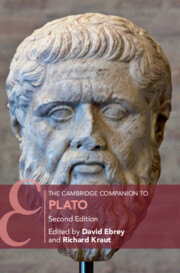Book contents
- The Cambridge Companion to Plato
- Other Volumes in the Series of Cambridge Companions
- The Cambridge Companion to Plato
- Copyright page
- Contents
- Contributors
- Acknowledgments
- Chronology
- Abbreviations
- 1 Introduction to the Study of Plato
- 2 Plato in his Context
- 3 Stylometry and Chronology
- 4 Plato’s Socrates and his Conception of Philosophy
- 5 Being Good at Being Bad: Plato’s Hippias Minor
- 6 Inquiry in the Meno
- 7 Why Erōs?
- 8 Plato on Philosophy and the Mysteries
- 9 The Unfolding Account of Forms in the Phaedo
- 10 The Defense of Justice in Plato’s Republic
- 11 Plato on Poetic Creativity: A Revision
- 12 Betwixt and Between: Plato and the Objects of Mathematics
- 13 Another Goodbye to the Third Man
- 14 Plato’s Sophist on False Statements
- 15 Cosmology and Human Nature in the Timaeus
- 16. The Fourfold Classification and Socrates’ Craft Analogy in the Philebus
- 17 Law in Plato’s Late Politics
- Bibliography
- Index Locorum
- General Index
- Other Volumes in the Series of Cambridge Companions (continued from page iii)
5 - Being Good at Being Bad: Plato’s Hippias Minor
Published online by Cambridge University Press: 21 July 2022
- The Cambridge Companion to Plato
- Other Volumes in the Series of Cambridge Companions
- The Cambridge Companion to Plato
- Copyright page
- Contents
- Contributors
- Acknowledgments
- Chronology
- Abbreviations
- 1 Introduction to the Study of Plato
- 2 Plato in his Context
- 3 Stylometry and Chronology
- 4 Plato’s Socrates and his Conception of Philosophy
- 5 Being Good at Being Bad: Plato’s Hippias Minor
- 6 Inquiry in the Meno
- 7 Why Erōs?
- 8 Plato on Philosophy and the Mysteries
- 9 The Unfolding Account of Forms in the Phaedo
- 10 The Defense of Justice in Plato’s Republic
- 11 Plato on Poetic Creativity: A Revision
- 12 Betwixt and Between: Plato and the Objects of Mathematics
- 13 Another Goodbye to the Third Man
- 14 Plato’s Sophist on False Statements
- 15 Cosmology and Human Nature in the Timaeus
- 16. The Fourfold Classification and Socrates’ Craft Analogy in the Philebus
- 17 Law in Plato’s Late Politics
- Bibliography
- Index Locorum
- General Index
- Other Volumes in the Series of Cambridge Companions (continued from page iii)
Summary
In the Hippias Minor, Socrates argues that the expert in a given domain is the one in a position to voluntarily violate the rules of that domain. For example, the expert archer can ensure that her arrows miss the target, whereas the novice archer might accidentally hit the target she’s trying to miss. Socrates claims, shockingly, that this point holds for justice as well: it is the expert in justice who will have the power to deliberately act unjustly. Though some accuse Socrates of drawing this conclusion on the basis of uncritical reliance on the craft analogy, I argue that in fact Socrates is identifying common ground between a variety of forms of practical normativity. In any activity that can be assessable as going well or badly, those who intentionally flout the norm, by erring on purpose, are better at it than those who unintentially flub the norm, by erring accidentally. Socrates’ argument places powerrather than the exercise of powerat the heart of ethics. The Hippias Minor shows why Socratic ethics is an ethics of virtue, rather than an ethics of virtue activation.
- Type
- Chapter
- Information
- The Cambridge Companion to Plato , pp. 146 - 172Publisher: Cambridge University PressPrint publication year: 2022

